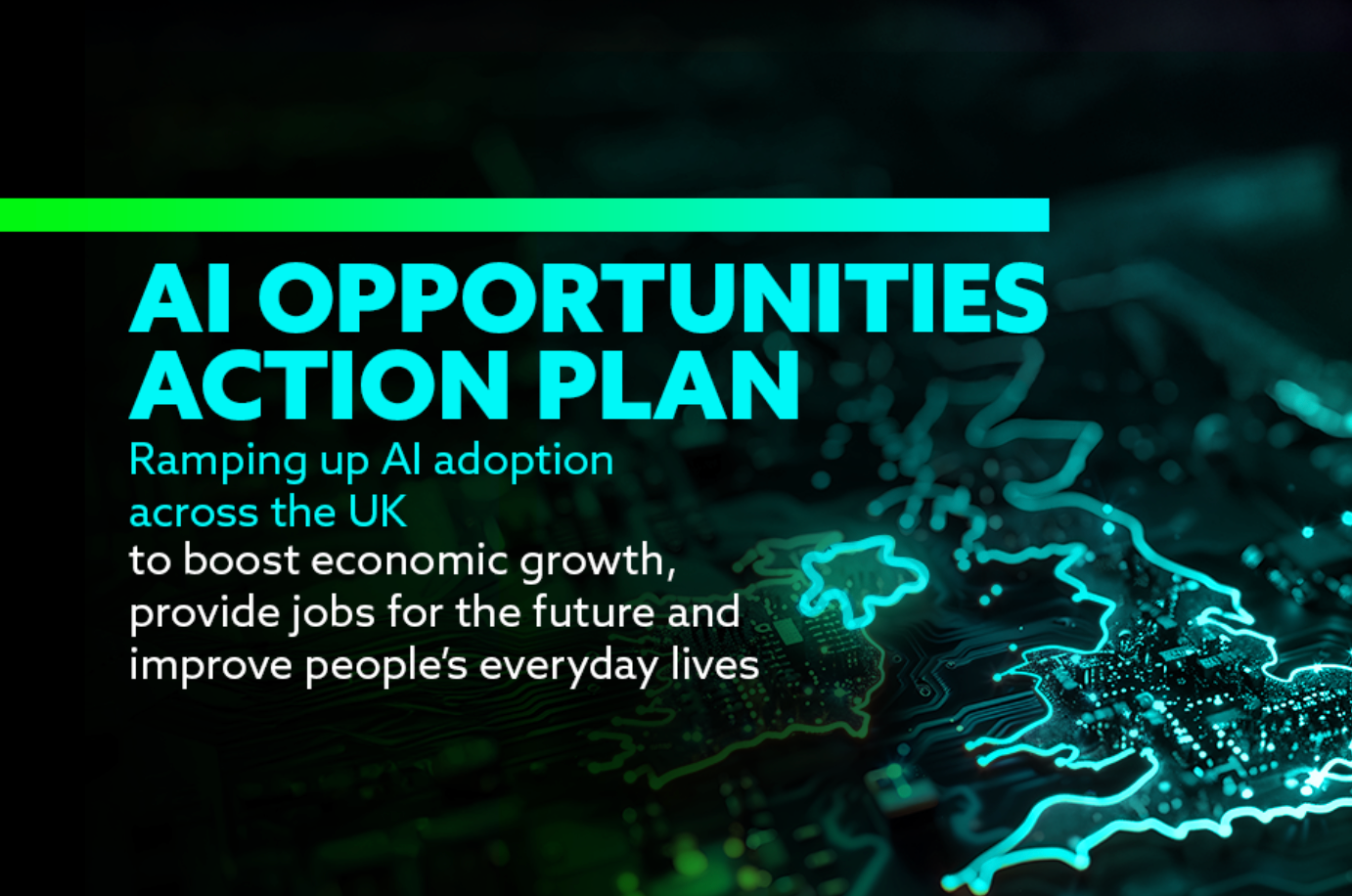Tech industry responds to Labour's AI Opportunities Action Plan
"Our values of democracy, open commerce and the rule of law are crucial for the free exchange of ideas needed to maximise AI’s potential."

Sir Keir Starmer's Labour government has unveiled a new action plan designed to make the UK a global AI "superpower".
The Prime Minister described AI as the "defining opportunity of our generation" and said it is already helping the NHS to save lives and create exciting new companies.
"We start from a position of strength," Starmer said. "This is the nation of Babbage, Turing and Lovelace – driving change is in our DNA. Already, Britain is the third largest AI market in the world.
"We have established a world-leading infrastructure for AI safety. Vast resources of talent in our universities and scientific institutions. Numerous technology companies, operating at the AI frontier, are proud to call our country home.
"And our values of democracy, open commerce and the rule of law are suited to the test of the times – crucial for the free exchange of ideas needed to maximise AI’s potential."
The government's AI Action Plan

One of the three overarching priorities of the Action Plan is a bid to "lay foundations" for AI.
The initial priority of any major public sector programme is, of course, making another plan, so the very first recommendation orders the government to set out a long-term strategy for the UK’s AI infrastructure needs, backed by a 10-year investment commitment.
It then sets out goals of expanding the capacity of the AI Research Resource (AIRR) by at least 20x by 2030 - starting within 6 months. This scheme gives other organisations the ability to host and operate large-scale compute systems for AI applications.
The action plan orders the appointment “AIRR programme directors” with "significant autonomy", who will be able to decide "quickly and independently provide large amounts of compute to high-potential projects of national importance, operating in a way that is strategic and mission-driven."
READ MORE: UK AI defence "gap" exposed as Keir Starmer vows to make Britain a world leader
It also describes plans for a National Data Library, which will focus on collecting and securely disseminating high-quality government data.
Additionally, the plan calls for the establishment of AI Growth Zones (AIGZs) to accelerate the building of data centres, including investment into areas with existing energy capacity such as post-industrial towns and coastal Scotland.
Another overarching priority focuses on the growth of "homegrown AI". A body called “UK Sovereign AI" will be set up to invest in promising AI firms, partner with frontier companies, and secure access to essential resources such as data, compute, and skilled talent.
This means aligning policy, procurement, and funding levers so that advanced AI R&D remains in the UK while also ensuring that its development aligns with British interests and values.
Finally, the plan calls for a focus on "changing lives" through AI, setting out how the government can become more innovative through a "Scan > Pilot > Scale" approach and working with the private sector.
Industry responses to the AI Action Plan

Snapshots of what the British tech community is saying about the plans:
Keeping up with the superpowers
Sam Robinson, AI policy lead and senior researcher at the Social Market Foundation, said: “The UK can be one of the top three world leaders on artificial intelligence and the government’s AI strategy is a step in the right direction to achieving that goal. Though we can’t compete at the same level as the US and China, we have the talent, the universities and the startups to succeed – we now need the right infrastructure and regulation.
"While the government’s AI strategy is light on policy detail, it sets out an ambitious direction for the UK that is clearly pro-innovation and seeks to maximise the opportunities from AI. This is a welcome shift from the previous government’s risk-averse emphasis on safety regulation, and presents an alternative model to the EU’s comparatively restrictive, over-regulated approach.
"Perhaps the biggest opportunity for the UK to establish itself as an AI leader is in the public sector. The UK is uniquely well placed to demonstrate how AI can improve the productivity and quality of public services, and Technology Secretary Peter Kyle is building a reputation for the UK as the country that is most ready and willing to seize the opportunity.
"Like the industrial revolution, AI has major social and economic risks, but countries that modernise will be much better placed than those that get left behind. Though there are details to be worked out along the way, this strategy clearly recognises this reality.”
More supercomputers = healthier citizens
Professor Dr Muhammad Bilal of Birmingham City University told Machine that barriers such as restrictive data-sharing regulations and high implementation costs must be removed to allow AI to reach its potential.
“NHS datasets, for example, could be invaluable for impactful AI innovations in healthcare. But they remain largely inaccessible to many researchers due to prohibitive costs and logistical hurdles.
“Initiatives like NHS Secure Data Environments are a great start but must be made more affordable, or ideally free, for academic institutions.
“Furthermore, the creation of city-specific supercomputers with free access for universities and researchers could significantly accelerate AI-driven innovations. This has the potential to create commercialisation opportunities that fuel the growth economy.
“Projects like GREENGAGE (a collaboration between BCU, UWE Bristol and several EU partners), uses AI to detect dozens of different kinds of road defects from dashcam footage.
“This will allow local authorities to respond and repair defects more quickly, find problem areas and provide insight into road comfort levels and air pollution. It’s also giving citizens opportunities to have a say on infrastructure planning in their local area by uploading footage and highlighting issues.
“These types of initiatives will align with the government’s visions whilst providing practical solutions to everyday issues.”
Where's the consumer protection?
Rocio Concha, Which? Director of Policy and Advocacy, said: "The government's blueprint does not mention consumers and many remain sceptical about using AI technologies. Which? research has also uncovered examples of AI chatbots putting consumers at risk, for example by recommending unsafe products to shoppers and enabling more sophisticated scams.
"The government must put robust regulatory mechanisms in place to monitor, evaluate and control AI systems, alongside best practice guidelines and access to clear and accessible redress schemes, as these will be essential for protecting consumers and empowering them to use these technologies with confidence."

And what about quantum?
Georges-Olivier Reymond, Co-founder and co-CEO of Pasqal called the conspicuous lack of quantum computing from the government’s Action Plan.
“The plan, while promising, raises concerns about its underlying infrastructure," he said. "While the plan mentions a new supercomputer, quantum computing - an essential technology for realising the full potential of AI at scale - is notably absent from the discussion.
“Currently, the primary challenge in AI advancement is the bottleneck created by limited computational resources. Quantum computing promises to overcome this by offering unprecedented processing power that can enhance AI by accelerating training processes, optimising algorithms and facilitating new approaches to machine learning and data processing.
“As the UK’s AI Opportunities Action Plan progresses, it will be important to monitor whether quantum computing is incorporated into the discussion. For now, however, its absence could limit the plan's long-term impact and effectiveness to fully capitalise on the potential of AI”.
The National Data Library could be great news for open source developers
Jan Wildeboer, EMEA Evangelist, Red Hat, said: "Today’s government announcement marks an important step for the UK economy and society, given AI’s potential to change the trajectory of multiple sectors and many lives.
"We believe the future of AI is open source: that open source technology is poised to do for LLMs what it has already done for Linux, the Cloud, Kubernetes and application development. Trust, security, and explainability are paramount in AI, meaning that everyone — not just those with the deepest pockets or more extensive resources — should be able to participate. Open-source innovation can help make AI more accessible, democratised and powerful.
"The introduction of a National Data Library speaks to the global movement we’re seeing towards the use of smaller, specialized models over large, general-purpose ones.
"Smaller models can be combined in a ‘swarm’, with the use of many small models for specific tasks. The use of small models with domain-specific data also helps reduce companies' dependence on large LLM vendors, whose solutions are often a black box in terms of algorithms, training data, or models. Small models, on the other hand, stand for transparency, traceability and reliability.”

Education, education, education (and partnerships)
Damian Stirrett, Group Vice President & General Manager UK & Ireland at ServiceNow, said: "The Prime Minister’s announcement of the new AI Opportunities Plan is an exciting milestone for UK industries. To remain competitive as a country, we must put the Plan’s ambitions into action through investing in education, upskilling initiatives, and partnerships between the public and private sectors.
"We are at a critical point in time, where political leaders recognise the great potential of technology as a growth driver leading to impactful business transformation.
"AI is, and will increasingly be, one of the biggest technological drivers behind economic growth in the UK. Implemented correctly, the benefits of AI in the public sector are endless, with AI-solutions helping enhance productivity, reduce resolution time and help streamline costs. This is why the specific recommendations in the government’s proposal are an important step towards the UK becoming a true AI leader.”
Focus on the data and AI will fall into place
James Hall, Vice President and Country Manager UK&I at Snowflake, said: "To truly capitalise on AI’s potential, the UK Government must also prioritise investments in data infrastructure. AI systems are only as powerful as the data they’re trained on, making high-quality, accessible data essential for the plan’s ambitions. Modern, scalable and secure data-sharing enables faster and more accurate AI insights that avoid hallucinations. This will help the UK remain globally competitive and, if the right balance is struck, it can lead in offering responsible and effective AI applications, benefitting everything from supercomputing to fixing potholes."
Is AI the passport to a more productive nation?
Craig Mill, Head of Public Sector for SAP UKI, said: "Productivity and efficiency are key watch words in the UK’s public sector as everyone is asked to do more with less. With a growing national debt and a heightened emphasis on departmental cost cutting, it’s important to do more than just tinker around the edges of delivery costs, which is not really a strategy for success.
“Our public sector provides vital services, from NHS and social care to benefits provisions and tax collection, the breadth of which pervades every aspect of our lives. But there are complex challenges across these public services as citizens expect more while there are demands to reduce the cost to serve combined with an ever-increasing cost to deliver.
“Ensuring these services are still here for generations to come requires a new way of thinking. While it’s no magic bullet, AI is a key piece of the puzzle, and technology as a whole needs to be at the centre of industry transformation. With that in mind, the UK’s re-commitment to a new digital centre of government is a welcome starting point.
“The government’s proposals must be met with action, and that requires our public sector to be digitally ready. SAP’s work across the industry to-date, such as with the government’s Unity Programme and many other government departments, agencies and local authorities, has focused on a transition to the cloud which together with data form the foundations for successful AI.
“However, AI can only be successful when it’s trained with the right data, and that data comes from known sources, so it can complement human service delivery and support our civil servants to do their job effectively and without unnecessary constraint. That’s how it will drive real transformation and become a mainstay of our industry transformation.”
Have you got a story or insights to share? Get in touch and let us know.




